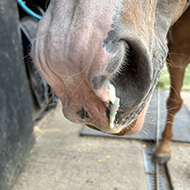EVJ asserts importance of bi-annual equine flu boosters

Image (C) Fiona Williams.
The Equine Veterinary Journal (EVJ) is highlighting the importance of bi-annual equine influenza (EI) booster vaccinations, as EI activity increases in the UK.
Following a significant shortage of EI vaccines, the supply has returned to normal levels, and equine epidemiologists are advising that veterinary clinics should re-implement bi-annual vaccination schedules, instead of annual boosters.
Published in EVJ, 'Equine Influenza bi-annual boosters: what does the evidence tell us?' considers previous outbreaks of EI, and highlights the impermanent nature of the protection that the vaccine provides.
Demonstrating the immunity gap in both individual horses and the horse population, the authors explain the importance of establishing and maintaining effective population level immunity to EI.
Victoria Colgate and Richard Newton, the authors of the piece, explained: “The equine industry must surely remain resolute and guided by scientific principles.
“The clear evidence from experimental, epidemiological and mathematical modelling studies shows why we must encourage clients to revert to a schedule of bi-annual boosters.
“We must also remind horse owners that animals already on six-monthly vaccination regimes were best positioned for the vaccine shortage with a built-in tolerance in their vaccination schedule; their levels of immunological protection would not be expected to decline to susceptible levels, even with a slight delay before being re-vaccinated.”
Editor of the EVJ, Professor Celia Marr, commented: “Although the recent EI vaccine shortage has necessitated a temporary relaxation of competition vaccine schedules, we must now renew the message that six-monthly boosters are optimal and necessary.”



 The latest
The latest